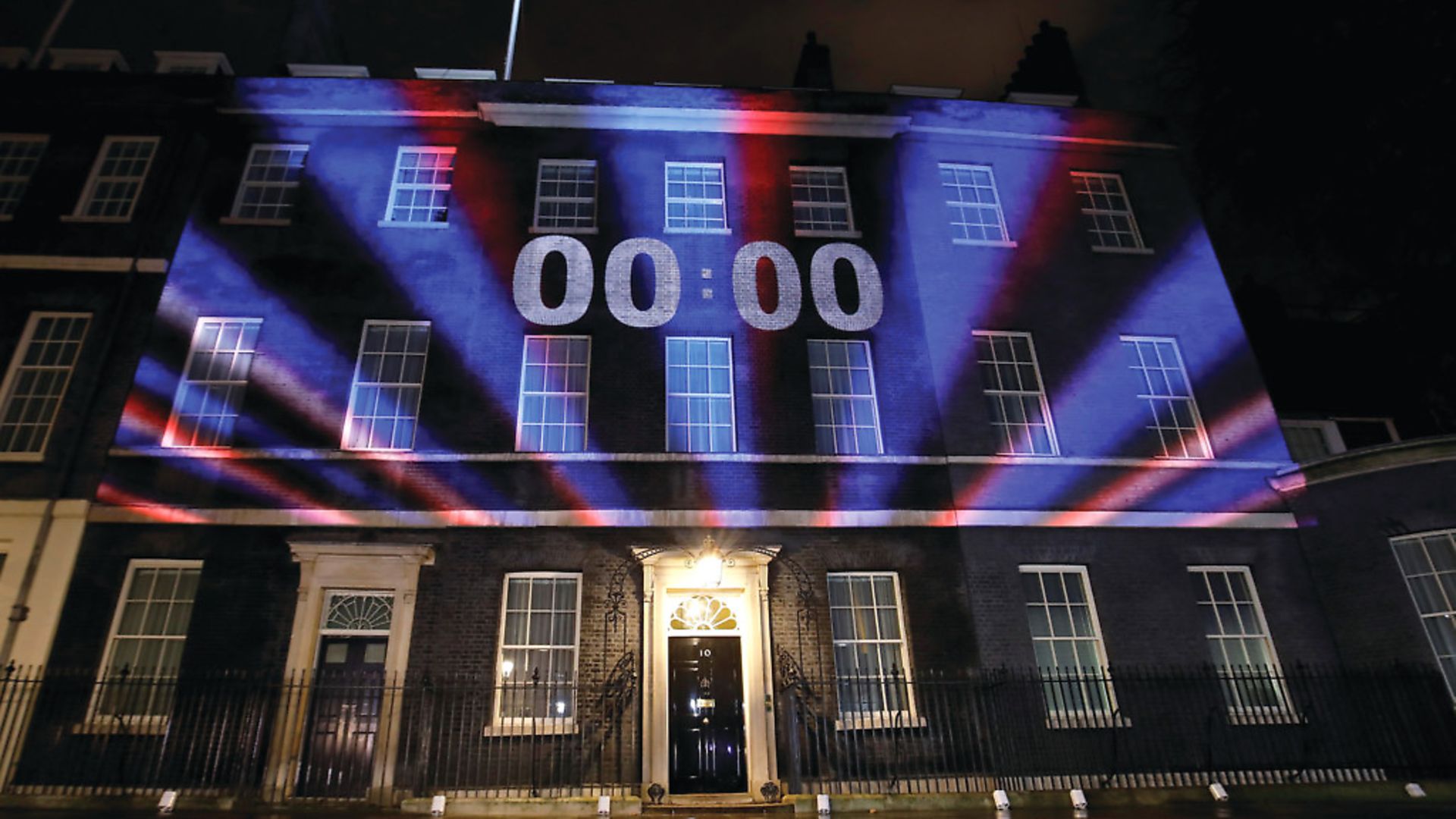
Number 10’s arrogant mishandling of both Brexit and Covid are combining, to produce dangerous consequences, warns STEVE RICHARDS
There are disturbing parallels between the British government’s calamitous approach to the global pandemic and its provocatively arrogant conduct in the Brexit negotiations.
The pandemic has already caused havoc in the UK with the death rate higher than most countries. The Brexit trade talks of multi-layered complexity face a nightmarishly tight deadline of the government’s choosing with potentially dire consequences for the economy. On both fronts Boris Johnson and his entourage claim to be more than satisfied with their performance so far.
The coming together of Covid-19 and Brexit was explicit when Johnson made his first big speech on the Brexit trade talks in February. He was the one who made the connection between the two:
‘We are starting to hear some bizarre autarkic rhetoric, when barriers are going up, and when there is a risk that new diseases such as coronavirus will trigger a panic and a desire for market segregation that go beyond what is medically rational… Then at that moment humanity needs some government somewhere that is willing at least to make the case powerfully for freedom of exchange, some country ready to take off its Clark Kent spectacles and leap into the phone booth and emerge with its cloak flowing as the supercharged champion, of the right of the populations of the earth to buy and sell freely among each other.’
Have your say
Send your letters for publication to The New European by emailing letters@theneweuropean.co.uk and pick up an edition each Thursday for more comment and analysis. Find your nearest stockist here or subscribe to a print or digital edition for just £13. You can also join our readers' Facebook group to keep the discussion and debate going with thousands of fellow pro-Europeans.
The infamous passage is revealing on so many levels. At a point when the virus was heading towards the UK Johnson loftily regraded responses of other countries as irrational. Many of those countries went on to suffer far fewer deaths and were able to end lockdown more smoothly and earlier. In terms of Brexit the argument was perverse, as Johnson was hailing free trade while taking a hard stand against the EU that risked the imposition of tariffs between the UK and its biggest market.
Above all Johnson’s preposterous remarks highlight a British exceptionalism that marked his early approach to the virus and still determines his chosen course in relation to Brexit. In No.10 they see the UK as a ‘supercharged champion’ liberated from Europe, as they once saw the UK as being uniquely well-placed to deal with a virus that was causing mayhem elsewhere.
The key ingredient that fuels this delusion is a wilful determination to ignore evidence. By early March, when coronavirus was declared a global pandemic, equivalent countries to the UK were preparing for strict lockdowns. The UK was an outlier, carrying on as usual at the behest of the libertarians in Downing Street. Those pleading for an earlier lockdown at the time included the chair of the health committee and former health secretary Jeremy Hunt, former cabinet minister Rory Stewart and the shadow health secretary, Jonathan Ashworth.
The outgoing Labour leader Jeremy Corbyn asked persistently why the UK government was taking a different approach to the rest of the world. There were plenty of senior scientists urging an early lockdown too if No.10 had wanted the ammunition to claim they were following ‘the science’.
Johnson, Dominic Cummings and the rest of their entourage thought they knew best in their early responses to the pandemic. Similarly they are convinced they know best about the consequences of Brexit in spite of the evidence that shows they are about to give the frail UK economy another hit.
Recently the Organisation for Economic Cooperation and Development forecast a slump in UK national income of 11.5%, the worst of any country in the developed world.
Part of its assessment warned that the failure to conclude a trade deal with the European Union by the end of 2020 or put in place alternative arrangements would have a strongly negative effect on trade and jobs. The position of No.10 is to seek no extension to the trade talks.
Instead of acknowledging the risks of leaving at the end of the year with a flimsy trade deal or no deal at all, the No.10 operation becomes more assertive, mistaking machismo for strength.
Even Johnson’s chief Brexit negotiator, the normally reticent David Frost, has become loudly provocative. Last month Frost wrote to Michel Barnier, that some of Brussels’ proposals were ‘egregious’ and not what ‘any democratic country could sign’. Barnier’s proposals are based on the Political Declaration that Johnson did sign last autumn.
Last week Frost tweeted grandly that the UK would seek no extension to the current talks, as if he held all the cards. In reality Frost negotiates on behalf of a small island with a struggling economy against the much bigger EU.
Frost speaks to Cummings several times a week, more than he does to Johnson. He has become another instrument of Cummings’ fantasies about ‘Europe’ and how machismo always wins.
No.10 assumes it can intimidate the EU into submission. This delusion is based on a wilful misreading of what happened last autumn when the EU agreed to a Withdrawal Agreement that differed from Theresa May’s.
The EU made its move not because Johnson and Cummings were strong but because the duo agreed to accept more or less what the EU had proposed in the first place before May negotiated a better deal.
But the Vote Leave campaign in No.10 only understands what it takes to be triumphant acts of machismo. The same approach was adopted with the virus in the early stages. While other world leaders went in to lockdown Johnson showed off that he shook hands with people at a hospital where there were patients suffering from the virus.
He ostentatiously ignored social distancing in the House of Commons and elsewhere. The prime minister seemed delighted that in the mighty UK at least people were sticking two fingers up at the virus and still going to race meetings, football matches and crammed pubs.
When the consequences of machismo do not go to plan the government denies any culpability. As the UK death rates soared compared with other countries the global chart was dropped from the daily press conferences.
If the information does not fit the narrative the information is changed. In April Cummings changed an earlier blog to include a section that foresaw the type of pandemic that has struck. In reality, when he made the change the pandemic was already causing seismic chaos.
If Brexit causes further chaos at the start of next year the government will change its narrative. Now it hails a liberated UK. If instead there is chaos it will blame Covid.
There have been several indications that some in No.10 conclude there is no better time to end the trade talks. The tragedy of Covid will be used as a protective shield for the turmoil of Brexit.
But sometimes the fantasies of the eternal campaigners in Downing Street are forced to face the realities of Covid and Brexit. Then they become confused revolutionaries.
After Johnson’s glamorous early assertiveness of urging people to carry on as normal he imposed belatedly a lockdown. Similarly he has changed tack on quarantines, the use of masks, schools’ opening, NHS fees for foreign workers, the significance of testing and much more.
On Brexit, when faced with the question of how to manage the border with the EU without the promised 50,000 UK customs agents in place and without building any of the planned customs sheds there came a sheepish answer. The UK government proposes that there will not be much of a border, at least temporarily.
This was not an expedient compromise, but a clash with reality. UK businesses already dealing with the desperate consequences of Covid were not ready and the government’s preparations were predictably behind schedule. Ironically and again predictably EU members are better prepared for border controls than the chaotic UK government and they are not the ones seeking a hard Brexit.
The confusion extends to the regulation of food standards. The trade secretary, Liz Truss, once a prominent Remain campaigner, assumed she would please No.10 evangelists by pursuing speedy talks with the US over a trade deal.
Yet some in government are still supportive of the farming sector that is alarmed by the double whammy of tariffs being imposed on their exports to the EU while the UK is flooded with cheap food from the US. Some of Johnson’s revolutionaries curse Truss for her free market evangelism and note that the government is risking all for a trade deal with president Trump who could be gone after the November election. Others hail Truss for valiantly pursing the logic of Brexit. Johnson and his fellow revolutionaries are bewildered by complexity.
But it is not wise to assume that sensible expediency will prevail in relation to Brexit. They still think they know best and assume critics are stuck in an outdated metropolitan bubble.
They marched close to the cliff’s edge in their response to Covid. The cliff’s edge is looming with Brexit. They might jump, assuming the UK that won a war in 1945 will land and flourish. Follow the pattern in relation to the virus. If they jump and the economy sinks further they will deny they jumped in the first place.
Steve Richards’ latest book is The Prime Ministers – Lessons of Leadership










